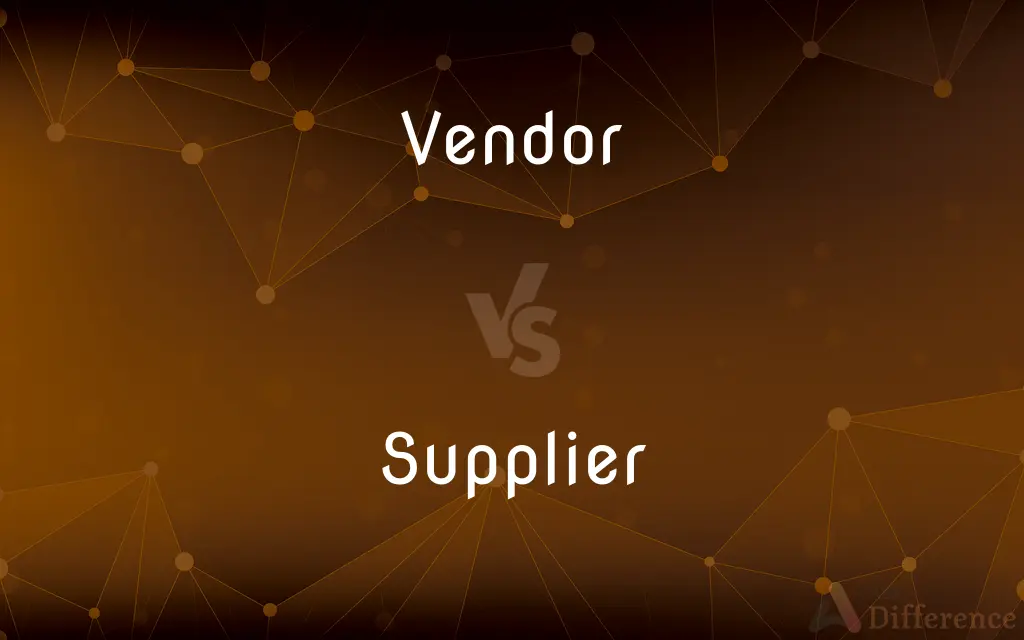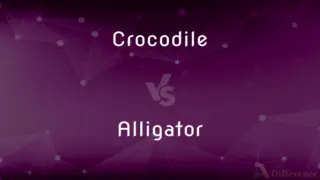Vendor vs. Supplier — What's the Difference?
By Tayyaba Rehman — Updated on September 22, 2023
A vendor sells products or services directly to consumers, while a supplier provides goods or services to businesses, usually in bulk.

Difference Between Vendor and Supplier
Table of Contents
ADVERTISEMENT
Key Differences
The terms "vendor" and "supplier" often overlap but serve different aspects of the sales process. A vendor is typically an entity that sells products or services directly to end consumers. They are the final point in the distribution channel, engaging directly with the customers, offering goods or services that are ready to use or consume. Vendors are seen across various markets, including food services, retail, and online platforms, where the focus is on transactional relationships with the end-users.
A supplier, conversely, provides goods or services to businesses. Suppliers usually deal in bulk quantities, providing raw materials, finished products, or services to manufacturers, retailers, or other businesses. Suppliers are integral to the supply chain, often having a more extensive, ongoing relationship with the purchaser, and may offer products that need further processing or addition to other products before reaching the consumer.
While vendors are primarily concerned with retailing products or offering services directly to the consumers, suppliers work to fulfill the needs of businesses. Vendors play a crucial role in providing consumers with ready-to-use or consume products or services, ensuring availability and accessibility. They can be individual sellers, retail stores, or online marketplaces focusing on consumer satisfaction and immediate needs.
Suppliers maintain a B2B (Business to Business) model, concentrating on the provision of necessary resources for businesses to produce or deliver their offerings. They can be manufacturers, wholesalers, or service providers, ensuring that businesses have the adequate input to maintain their operations. The relationships between suppliers and businesses are generally long-term and involve negotiations, contracts, and agreements.
In conclusion, vendors are entities or individuals that deal directly with consumers, providing finished goods or services, while suppliers are the backbone of the business supply chain, providing resources, products, or services that companies need to conduct their business operations.
ADVERTISEMENT
Comparison Chart
Focus
Sells directly to end consumers.
Provides goods or services to businesses.
Quantity
Typically sells in smaller quantities.
Typically deals in bulk quantities.
Relationship
Transactional relationships with consumers.
Ongoing relationships with businesses.
Model
B2C (Business to Consumer) model.
B2B (Business to Business) model.
Type of Goods
Offers finished, ready-to-use products or services.
May offer raw materials or products needing processing.
Compare with Definitions
Vendor
Vendors can be individual sellers or companies.
The local vendor sells fresh produce every weekend.
Supplier
Suppliers may provide raw materials or finished products.
The food supplier ensures the restaurant never runs out of essential ingredients.
Vendor
They focus on consumer satisfaction and immediate needs.
The online vendor ensures quick delivery of ordered items.
Supplier
They are integral to the supply chain.
The automotive supplier plays a crucial role in vehicle production.
Vendor
A vendor is a person or entity selling goods or services.
The street vendor offers a variety of food items.
Supplier
They operate in a B2B (Business to Business) model.
The industrial supplier caters to the needs of various factories.
Vendor
Vendors operate in retail, directly dealing with end consumers.
The vendor at the mall sells fashionable clothing.
Supplier
A supplier provides products or services to other businesses.
The supplier delivers raw materials to various manufacturers.
Vendor
They typically have transactional, short-term relationships with buyers.
The software vendor provides customers with the latest updates.
Supplier
Suppliers generally deal in bulk and have ongoing relationships with businesses.
The office supplier provides companies with stationary items regularly.
Vendor
In a supply chain, a vendor, or a seller, is an enterprise that contributes goods or services. Generally, a supply chain vendor manufactures inventory/stock items and sells them to the next link in the chain.
Supplier
A person or organization that provides something needed such as a product or service
The company has to pay suppliers within 90 days of purchase
Suppliers of health care
Every major energy supplier upped their prices
Vendor
A person or company offering something for sale, especially a trader in the street
An Italian ice-cream vendor
Supplier
To make available for use; provide
Does the hotel supply towels?.
Vendor
One that sells or vends something
A street vendor.
A vendor of software products on the Web.
Supplier
To provide something necessary or desired to; furnish or equip
Supplied the players with uniforms.
Vendor
One that provides products or services to a business for a fee.
Supplier
To have as a necessary or desirable feature
A crime scene that supplied valuable evidence.
Vendor
A vending machine.
Supplier
To fill sufficiently; satisfy
Supply a need.
Vendor
A person or a company that vends or sells.
Supplier
To make up for (a deficiency, for example); compensate for.
Vendor
A vending machine.
Supplier
The act of supplying
Funds for the supply of the expedition.
Vendor
To bundle third-party dependencies with the source code for one's own program.
I distributed my application with a vendored copy of Perl so that it wouldn't use the system copies of Perl where it is installed.
Supplier
An amount available or sufficient for a given use; stock
Our supply of milk is low.
Vendor
As the software vendor, to bundle one's own, possibly modified version of dependencies with a standard program.
Strawberry Perl contains vendored copies of some CPAN modules, designed to allow them to run on Windows.
Supplier
Often supplies Materials or provisions stored and dispensed when needed.
Vendor
A vender; a seller; the correlative of vendee.
Supplier
(Economics) The amount of a commodity available for meeting a demand or for purchase at a given price.
Vendor
Someone who promotes or exchanges goods or services for money
Supplier
One who supplies; a provider.
Supplier
(soccer) Someone who assists (sets up) a goal.
Supplier
One who supplies.
Supplier
Someone whose business is to supply a particular service or commodity
Common Curiosities
Do vendors usually sell in smaller quantities?
Yes, vendors often sell goods or services in smaller, individual or household quantities.
Can a business be both a vendor and a supplier?
Yes, a business can act as a vendor to consumers and as a supplier to other businesses.
Are vendors integral to retail industries?
Yes, vendors play a crucial role in retail industries, selling goods or services directly to consumers.
Is the relationship between businesses and suppliers long-term?
Typically, suppliers maintain long-term relationships with businesses involving contracts and agreements.
Are suppliers usually involved in B2B transactions?
Yes, suppliers typically engage in B2B transactions, providing goods or services to other businesses.
Can a vendor be an individual?
Yes, a vendor can be an individual selling products or services directly to consumers.
Are suppliers a part of the supply chain?
Yes, suppliers are a crucial part of the supply chain, providing businesses with the necessary goods or services.
Do suppliers deal with finished products?
Suppliers can deal with both raw materials and finished products depending on the needs of their business clients.
Is a vendor’s focus primarily on consumer satisfaction?
Yes, vendors primarily focus on meeting the immediate needs and ensuring the satisfaction of end consumers.
Is the relationship with a vendor usually transactional?
Yes, relationships with vendors are typically transactional and shorter-term focused on individual sales.
Can a supplier provide services in addition to products?
Absolutely, suppliers can provide a variety of services and products to businesses.
Do suppliers and vendors operate on different business models?
Yes, vendors usually operate on a B2C model, while suppliers operate on a B2B model.
Share Your Discovery

Previous Comparison
Crocodile vs. Alligator
Next Comparison
Cheetah vs. JaguarAuthor Spotlight
Written by
Tayyaba RehmanTayyaba Rehman is a distinguished writer, currently serving as a primary contributor to askdifference.com. As a researcher in semantics and etymology, Tayyaba's passion for the complexity of languages and their distinctions has found a perfect home on the platform. Tayyaba delves into the intricacies of language, distinguishing between commonly confused words and phrases, thereby providing clarity for readers worldwide.
















































